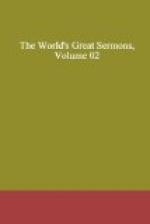John Tillotson, archbishop of Canterbury, renowned as a preacher, was born at Sowerby, in Yorkshire, in 1630, the son of an ardent Independent. After graduating from Clare College, Cambridge, he began to preach in 1661, in connection with the Presbyterian wing of the Church of England. He, however, submitted to the Act of Uniformity the following year, and in 1663 was inducted into the rectory of Veddington, Suffolk. He was also appointed preacher to Lincoln’s Inn, was made prebendary of Canterbury in 1670 and dean in 1672. William III regarded him with high favor, and he succeeded the nonjuring Sancroft in the arch-see of Canterbury. His sermons are characterized by stateliness, copiousness and lucidity, and were long looked upon as models of correct pulpit style. He died in 1694.
TILLOTSON
1630-1694
THE REASONABLENESS OF A RESURRECTION
Why should it be thought a thing incredible with you that God should raise the dead?—Acts xxvi., 8.
The resurrection of the dead is one of the great articles of the Christian faith; and yet so it hath happened that this great article of our religion hath been made one of the chief objections against it. There is nothing that Christianity hath been more upbraided for withal, both by the heathens of old and by the infidels of later times, than the impossibility of this article; so that it is a matter of great consideration and consequence to vindicate our religion in this particular. But if the thing be evidently impossible, then it is highly unreasonable to propose it to the belief of mankind.
I know that some, more devout than wise, and who, it is to be hoped, mean better than they understand, make nothing of impossibilities in matters of faith, and would fain persuade us that the more impossible anything is, for that very reason it is the fitter to be believed; and that it is an argument of a poor and low faith to believe only things that are possible; but a generous and heroical faith will swallow contradictions with as much ease as reason assents to the plainest and most evident propositions. Tertullian, in the heat of his zeal and eloquence, upon this point of the death and resurrection of Christ, lets fall a very odd passage, and which must have many grains of allowance to make it tolerable: “prosus credible est (saith he), quia ineptum est; certum est, quia impossible—it is therefore very credible, because it is foolish, and certain, because it is impossible”; “and this (says he) is necessarium dedecus fidei,” that is, “it is necessary the Christian faith should be thus disgraced by the belief of impossibilities and contradictions.” I suppose he means that this article of the resurrection was not in itself the less credible because the heathen philosophers caviled at it as a thing impossible and contradictious, and endeavored to disgrace the Christian religion upon that account. For if he meant otherwise, that the thing was therefore credible because it was really and in itself foolish and impossible; this had been to recommend the Christian religion from the absurdity of the things to be believed; which would be a strange recommendation of any religion to the sober and reasonable part of mankind.




